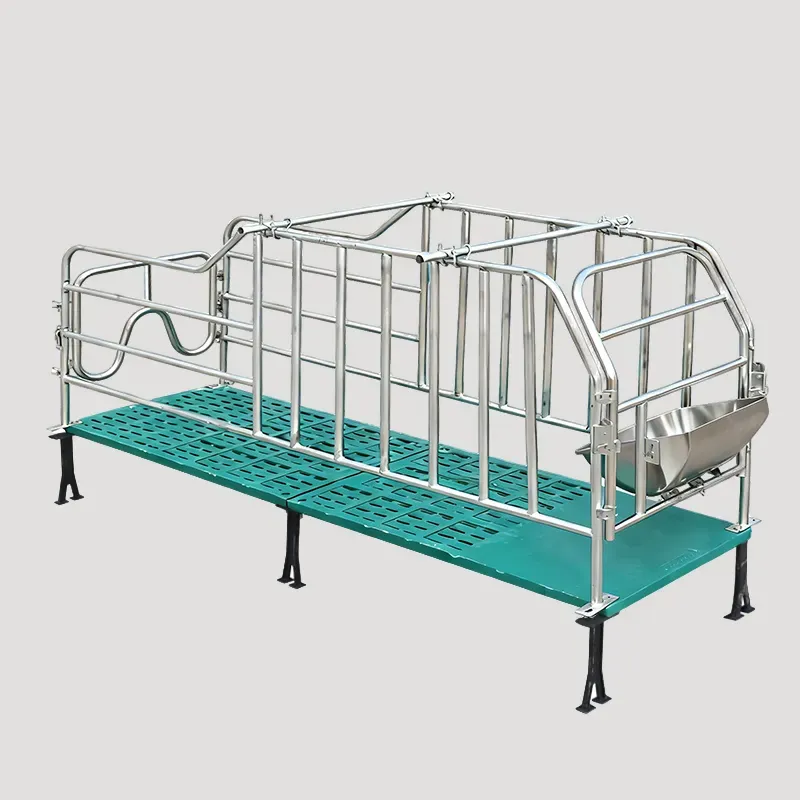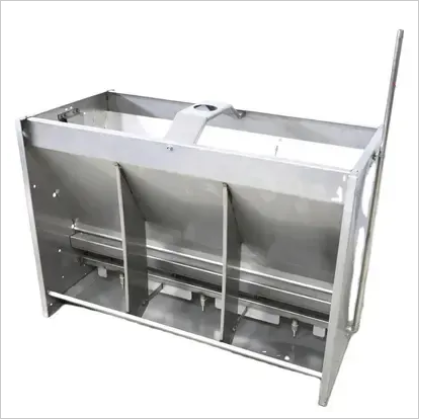Modern swine farming has evolved dramatically over the past few decades, transforming from traditional outdoor operations to sophisticated indoor facilities that prioritize animal welfare, production efficiency, and economic sustainability. At the heart of this transformation lies the strategic implementation of specialized pig equipment designed to optimize every aspect of the farming process. Today's commercial pig operations rely heavily on advanced housing systems, feeding technologies, and environmental controls that work together to create optimal conditions for pig health and growth while maximizing operational profitability.

The integration of purpose-built pig equipment has become essential for maintaining competitive advantages in the global pork market. Farmers who invest in quality housing systems, automated feeding solutions, and climate control technologies consistently demonstrate improved feed conversion ratios, reduced mortality rates, and enhanced overall herd performance. This systematic approach to equipment selection and implementation directly correlates with improved animal welfare standards and long-term operational sustainability.
Essential Housing Systems for Swine Operations
Farrowing and Nursery Facilities
Farrowing operations represent one of the most critical phases in pig production, requiring specialized pig equipment that ensures the safety and comfort of both sows and piglets. Modern farrowing systems incorporate adjustable side panels, heated zones for newborns, and ergonomic designs that facilitate easy management and cleaning. These systems are engineered to reduce piglet mortality through better temperature control and protection from crushing incidents.
Contemporary farrowing crates feature smooth surfaces and rounded edges to prevent injury while providing adequate space for natural maternal behaviors. The integration of automatic feeding systems within these facilities ensures consistent nutrition delivery while reducing labor requirements. Many operations now utilize farrowing rooms with individual climate control capabilities, allowing managers to optimize environmental conditions for each litter's specific needs.
Nursery facilities require equally sophisticated pig equipment to support the transition of weaned piglets into group housing environments. Modern nursery systems incorporate heated flooring, adjustable ventilation systems, and specialized feeders designed for young pigs. These facilities often feature multi-level housing arrangements that maximize space utilization while maintaining proper group sizes for optimal social development and growth performance.
Growing and Finishing Barn Infrastructure
Growing and finishing operations demand robust pig equipment capable of withstanding the physical demands of larger animals while maintaining operational efficiency. Modern finishing barns utilize slatted flooring systems combined with automated manure management technologies that significantly reduce labor requirements and improve environmental conditions. These systems are designed to handle the waste production of high-density pig populations while maintaining sanitary conditions.
Ventilation systems in finishing barns represent sophisticated pig equipment installations that regulate air quality, temperature, and humidity levels throughout the facility. Computer-controlled exhaust fans and inlet systems work in coordination to maintain optimal air exchange rates while minimizing energy consumption. These systems often incorporate emergency backup power supplies and alarm systems to protect animal welfare during equipment failures or power outages.
Space allocation and pen design within finishing facilities require careful consideration of pig behavior and growth patterns. Modern pig equipment includes adjustable penning systems that can be reconfigured as animals grow, ensuring appropriate space per animal throughout the production cycle. These flexible systems allow operations to optimize facility utilization while maintaining animal welfare standards and production efficiency targets.
Automated Feeding and Nutrition Management
Precision Feeding Technologies
Advanced feeding systems represent a cornerstone of modern pig equipment installations, providing precise control over nutrition delivery while reducing feed waste and labor costs. Automated feeding systems can deliver customized rations to individual pens or groups based on predetermined schedules and nutritional requirements. These systems often incorporate weighing mechanisms and computer controls that track feed consumption patterns and adjust delivery quantities accordingly.
Liquid feeding systems have gained popularity in larger operations due to their ability to incorporate wet byproducts and achieve superior feed conversion ratios. This pig equipment requires sophisticated pumping systems, storage tanks, and distribution networks that can handle various feed consistencies while maintaining nutritional integrity. Regular maintenance and calibration of these systems are essential for optimal performance and consistent animal nutrition.
Electronic sow feeding systems provide individual nutrition management for breeding animals, ensuring each sow receives appropriate feed quantities based on body condition and reproductive stage. These systems utilize electronic identification tags and computer-controlled feed stations to deliver personalized nutrition programs. The pig equipment allows for precise monitoring of feed intake patterns, enabling early detection of health issues and optimization of breeding performance.
Feed Storage and Handling Systems
Efficient feed storage systems are crucial components of comprehensive pig equipment installations, protecting feed quality while ensuring consistent availability for automated delivery systems. Modern bulk feed storage facilities incorporate moisture control systems, temperature monitoring, and pest prevention measures that maintain feed nutritional value and safety. These storage systems often feature automated inventory management capabilities that track feed usage and alert managers when reordering is necessary.
Conveyor and auger systems transport feed from storage facilities to individual feeding stations throughout the operation. This pig equipment must be designed to handle various feed types and particle sizes while minimizing segregation and contamination risks. Regular cleaning and maintenance protocols are essential for preventing feed contamination and ensuring consistent delivery performance across all feeding points.
Feed milling and mixing equipment allows larger operations to produce customized rations on-site, reducing feed costs while maintaining quality control. These systems can incorporate various ingredients and supplements to create specific nutritional profiles for different production phases. On-site feed production requires significant investment in pig equipment but often provides substantial long-term cost savings and improved nutritional flexibility for large-scale operations.
Environmental Control and Climate Management
Ventilation and Air Quality Systems
Proper ventilation represents one of the most critical aspects of pig equipment design, directly impacting animal health, growth performance, and overall facility management. Modern ventilation systems utilize variable-speed fans and computerized controls that automatically adjust air exchange rates based on temperature, humidity, and air quality measurements. These systems are designed to maintain optimal environmental conditions while minimizing energy consumption and operational costs.
Air filtration systems have become increasingly important in modern pig operations, particularly for breeding facilities and nurseries where disease prevention is paramount. High-efficiency particulate air filters and ultraviolet sterilization systems can be integrated into ventilation equipment to reduce pathogen transmission and improve overall herd health. These advanced pig equipment installations require regular maintenance and monitoring to ensure continued effectiveness.
Emergency ventilation systems provide backup air circulation during power failures or equipment malfunctions, preventing dangerous temperature spikes and air quality deterioration. These systems often incorporate battery backup power supplies and automatic activation mechanisms that engage when primary ventilation equipment fails. Investment in reliable emergency pig equipment is essential for protecting animal welfare and preventing catastrophic losses during system failures.
Temperature and Humidity Control
Heating and cooling systems must be carefully integrated with ventilation equipment to maintain optimal temperature ranges throughout the facility. Modern pig equipment includes radiant heating systems for young animals, evaporative cooling systems for hot weather management, and computer-controlled thermostats that automatically adjust environmental conditions. These systems are designed to respond quickly to temperature fluctuations while maintaining energy efficiency.
Humidity control systems work in conjunction with temperature management equipment to maintain optimal moisture levels that promote animal comfort and prevent respiratory issues. Dehumidification equipment becomes particularly important in regions with high ambient humidity levels or during certain seasons when natural ventilation cannot adequately control moisture levels within the facility.
Zone-specific climate control allows different areas of the facility to maintain unique environmental conditions based on the specific needs of different animal groups. This pig equipment enables nursery areas to maintain higher temperatures while finishing areas operate at cooler settings, optimizing animal comfort and performance throughout the facility. Individual zone control also improves energy efficiency by avoiding unnecessary heating or cooling of unoccupied areas.
Waste Management and Environmental Compliance
Manure Collection and Processing Systems
Effective manure management systems are essential components of modern pig equipment installations, ensuring environmental compliance while converting waste products into valuable resources. Automated scraper systems and flush systems remove manure from housing areas on regular schedules, maintaining sanitary conditions and reducing labor requirements. These systems must be designed to handle high volumes of waste while minimizing odor production and environmental impact.
Anaerobic digestion systems represent advanced pig equipment that converts manure into renewable energy while reducing overall waste volumes. These systems require significant initial investment but can provide substantial long-term benefits through energy production and reduced waste disposal costs. Proper system design and maintenance are critical for achieving optimal biogas production and maintaining environmental compliance standards.
Solid-liquid separation equipment processes liquid manure to create manageable waste streams for different disposal or utilization methods. This pig equipment enables operations to maximize the value of manure nutrients while minimizing storage and transportation costs. Separated solids can be composted or used as bedding material, while liquid fractions can be applied as fertilizer through irrigation systems.
Water Management and Treatment
Water quality management systems ensure consistent delivery of clean, safe water for animal consumption while managing wastewater from cleaning and sanitation activities. Modern pig equipment includes water filtration systems, chlorination equipment, and water quality monitoring devices that maintain optimal water conditions throughout the facility. Regular testing and treatment are essential for preventing waterborne diseases and maintaining animal health.
Wastewater treatment systems process wash water and facility runoff to meet environmental discharge standards or enable water reuse within the operation. These systems may incorporate settling basins, biological treatment processes, and advanced filtration technologies depending on local regulations and operational requirements. Investment in proper wastewater treatment pig equipment is essential for maintaining environmental compliance and community relations.
Water conservation systems reduce overall water consumption through recycling and efficiency improvements, lowering operational costs while reducing environmental impact. High-pressure washing systems, water-efficient drinkers, and leak detection equipment help minimize water waste while maintaining sanitation standards. These pig equipment investments often provide rapid payback through reduced utility costs and improved operational efficiency.
Health Monitoring and Management Technologies
Disease Prevention and Biosecurity Systems
Biosecurity equipment represents a critical investment in modern pig operations, preventing disease introduction and transmission throughout the facility. Entry protocols require specialized pig equipment including shower facilities, clothing change areas, and disinfection systems that ensure all personnel follow proper biosecurity procedures. These systems must be designed to handle varying numbers of visitors while maintaining consistent disinfection effectiveness.
Vehicle disinfection systems treat trucks and equipment entering the facility premises, preventing pathogen transmission from external sources. These systems typically include wheel wash stations, vehicle spray systems, and driver protocols that ensure comprehensive disinfection of all incoming vehicles. Proper design and maintenance of this pig equipment is essential for maintaining facility biosecurity integrity.
Isolation facilities provide quarantine capabilities for new animals or sick individuals, preventing disease spread within the main production areas. These facilities require independent ventilation systems, separate waste management capabilities, and specialized pig equipment that enables proper animal care while maintaining biosecurity separation. Investment in quality isolation facilities often prevents much larger losses from disease outbreaks.
Health Monitoring and Diagnostic Equipment
Electronic monitoring systems track individual animal health parameters and behavior patterns, enabling early detection of health issues before they become serious problems. This pig equipment includes electronic identification tags, automated weighing systems, and behavior monitoring devices that provide continuous health surveillance capabilities. Data from these systems helps veterinarians and managers make informed treatment and management decisions.
Diagnostic equipment enables on-site testing for various diseases and health conditions, reducing the time required for diagnosis and treatment. Portable testing devices, laboratory equipment, and sample collection systems allow operations to quickly identify health issues and implement appropriate treatment protocols. Investment in diagnostic pig equipment often reduces veterinary costs while improving treatment outcomes through faster intervention.
Vaccination and treatment equipment ensures proper administration of preventive medicines and treatments throughout the facility. Automated injection systems, needle-free vaccination devices, and medicine delivery systems reduce labor requirements while ensuring consistent and accurate treatment delivery. Proper calibration and maintenance of this pig equipment is essential for achieving optimal treatment effectiveness and animal welfare.
Economic Benefits and Return on Investment
Production Efficiency Improvements
Strategic investment in modern pig equipment consistently demonstrates measurable improvements in key production metrics including feed conversion ratios, daily weight gains, and overall throughput capacity. Operations that implement comprehensive equipment upgrades typically achieve feed conversion improvements of 10-15% compared to older systems, directly translating to reduced production costs and improved profitability. These efficiency gains become particularly significant in large-scale operations where small percentage improvements generate substantial financial benefits.
Labor efficiency represents another major economic benefit of modern pig equipment installations, with automated systems reducing staffing requirements while improving consistency of care and management procedures. Advanced feeding systems, environmental controls, and health monitoring equipment enable single employees to manage larger animal populations more effectively than traditional manual methods. This labor efficiency becomes increasingly important as agricultural labor costs continue to rise and availability becomes more limited.
Facility utilization improvements through flexible pig equipment designs allow operations to maximize throughput capacity without expanding physical infrastructure. Adjustable housing systems, multi-purpose facilities, and efficient space layouts enable higher animal densities while maintaining welfare standards and production performance. These utilization improvements provide substantial returns on investment by increasing revenue potential without proportional increases in fixed costs.
Long-term Financial Planning and Sustainability
Depreciation schedules for pig equipment investments typically range from 7-15 years depending on equipment type and usage intensity, requiring careful financial planning to ensure adequate cash flow for replacement and upgrades. Operations that develop systematic equipment replacement schedules avoid emergency failures while taking advantage of technological improvements and efficiency gains available in newer systems. Proper maintenance and care can extend equipment life significantly beyond standard depreciation schedules.
Energy efficiency improvements through modern pig equipment installations reduce ongoing operational costs while supporting environmental sustainability goals. Advanced ventilation systems, efficient lighting, and automated controls can reduce energy consumption by 20-30% compared to older equipment, providing ongoing cost savings throughout the equipment lifecycle. These energy savings become increasingly valuable as utility costs continue to rise and environmental regulations become more stringent.
Risk mitigation through reliable pig equipment reduces the financial impact of equipment failures, disease outbreaks, and environmental challenges that can devastate unprepared operations. Investment in backup systems, monitoring equipment, and quality components provides insurance against catastrophic losses while ensuring consistent production performance. The cost of comprehensive pig equipment systems often represents a small fraction of potential losses from major production disruptions.
FAQ
What factors should be considered when selecting pig equipment for a new operation?
When selecting pig equipment for new operations, primary considerations include production scale, budget constraints, local climate conditions, and regulatory requirements. The equipment must be appropriately sized for planned animal populations while allowing for future expansion possibilities. Quality and reliability should take precedence over initial cost savings, as equipment failures can result in significant losses that far exceed purchase price differences. Additionally, consider the availability of local service support and replacement parts when evaluating different equipment manufacturers and suppliers.
How often should pig equipment be maintained and replaced?
Maintenance schedules for pig equipment vary significantly depending on equipment type, usage intensity, and environmental conditions, but most systems require monthly inspections and quarterly comprehensive maintenance procedures. Critical systems like ventilation and feeding equipment may require weekly or daily attention to ensure optimal performance and prevent failures. Replacement schedules typically range from 7-15 years for major equipment components, though regular maintenance can extend service life considerably. Develop written maintenance protocols and keep detailed service records to optimize equipment performance and plan for future replacement needs.
What are the most important pig equipment investments for improving animal welfare?
The most impactful pig equipment investments for animal welfare include climate control systems that maintain optimal temperature and air quality, comfortable housing designs that allow natural behaviors, and reliable feeding systems that ensure consistent nutrition. Proper ventilation equipment prevents respiratory issues and reduces stress levels, while appropriate housing dimensions and flooring materials promote animal comfort and reduce injury risks. Emergency backup systems for critical equipment protect animal welfare during power outages or equipment failures, making them essential investments for responsible operations.
How can pig equipment investments be justified economically in competitive markets?
Economic justification for pig equipment investments requires comprehensive analysis of production efficiency improvements, labor cost reductions, and risk mitigation benefits compared to investment costs. Modern equipment typically improves feed conversion ratios, reduces mortality rates, and increases labor efficiency, all of which directly impact profitability. Additionally, equipment investments often reduce regulatory compliance costs and insurance premiums while improving product quality and consistency. Calculate return on investment over the equipment lifecycle rather than focusing solely on initial costs, and consider the competitive advantages that modern equipment provides in increasingly challenging market conditions.
Table of Contents
- Essential Housing Systems for Swine Operations
- Automated Feeding and Nutrition Management
- Environmental Control and Climate Management
- Waste Management and Environmental Compliance
- Health Monitoring and Management Technologies
- Economic Benefits and Return on Investment
-
FAQ
- What factors should be considered when selecting pig equipment for a new operation?
- How often should pig equipment be maintained and replaced?
- What are the most important pig equipment investments for improving animal welfare?
- How can pig equipment investments be justified economically in competitive markets?

